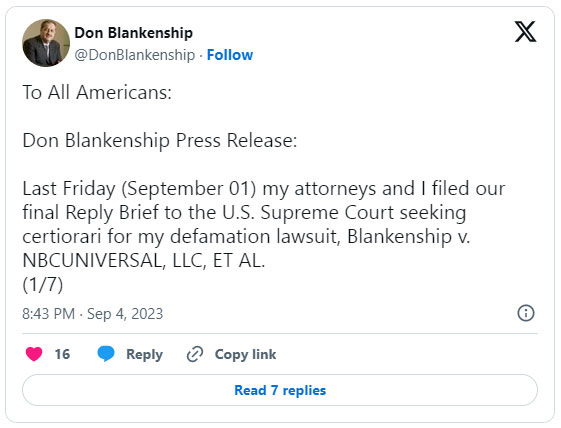Justice Thomas Speaks Out Alone Against Landmark Supreme Court Ruling
Bringing closure to a complicated suit, the U.S. Supreme Court rejected an appeal request from Don Blankenship, a former coal company CEO and 2020 presidential candidate.
Gary Ray - OCTOBER 11, 2023
The case centers around a defamation case involving Don Blankenship. His case was impacted by the 1964 ruling in New York Times v. Sullivan. That landmark case provided a framework for defining defamation.
That ruling defined “actual malice” as an untrue statement designed to negatively impact a person’s standing or reputation. The defendant must have known the statement was not true or had reckless disregard for the statement’s accuracy.
The history
Following his loss in a 2018 Senate race, Don Blankenship argued that several news outlets, including CNN, Fox and Newsmax, had defamed him.
At the time, multiple news outlets reported that Blankenship had spent a year in prison on charges related to a 2010 coal mine explosion in West Virginia. The explosion left 29 people dead.
Blankenship argued that MSNBC, CNN, Fox News and other outlets described him as a “felon.” Blankenship complained that he was never charged or convicted of a felony but instead was convicted by a jury in 2015 of a federal conspiracy charge that was classified as a misdemeanor, according to the Epoch Times.
A lower court ruled against Blankenship. The case was elevated to the 4th U.S. Circuit Court of Appeals, which affirmed the district court’s ruling that CNN, Fox News and 14 other outlets sued by Blankenship did not act with “actual malice,” as defined by New York Times v. Sullivan.
The case was appealed to the U.S. Supreme Court, which elected to let stand the lower court’s ruling. Justice Clarence Thomas agreed with the lower court’s ruling but called on the high court to overturn the landmark New York Times v. Sullivan ruling.
Before the ruling, Blankenship tried to make his case in a post on X. He wrote: “The point of the lawsuit is that the Press cannot be allowed to remain a Fourth Branch of government that spreads propaganda and hides government corruption.”
Blankenship added: “We caught the government and the Press red-handed in a worse than Watergate scandal. We have provided the Court clear proof not only of defamation but also of election sabotage.”
CLICK THE IMAGE BELOW TO ACCESS THE TWEET >
Thomas, an appointee of former President George H.W. Bush, has previously stated that the Supreme Court should overturn the landmark 1964 ruling. He reiterated his stance again on Tuesday, writing a brief opinion that “I continue to adhere to my view that we should reconsider the actual malice standard.”
Commenting on the case, Thomas said: “The [1964] Court usurped control over libel law and imposed its own elevated standard in New York Times Co. v. Sullivan.”
Thomas pointing out that the court “did not base this ‘actual malice’ rule in the original meaning of the First Amendment. It limited its analysis of the historical record to a loose inference from opposition surrounding the Sedition Act of 1798.”
Thomas added that “while Mr. Blankenship asks us to revisit New York Times, [he does not believe the Court should] … take up that question in this case because it appears that Blankenship’s claims are independently subject to an actual-malice standard as a matter of state law.”






